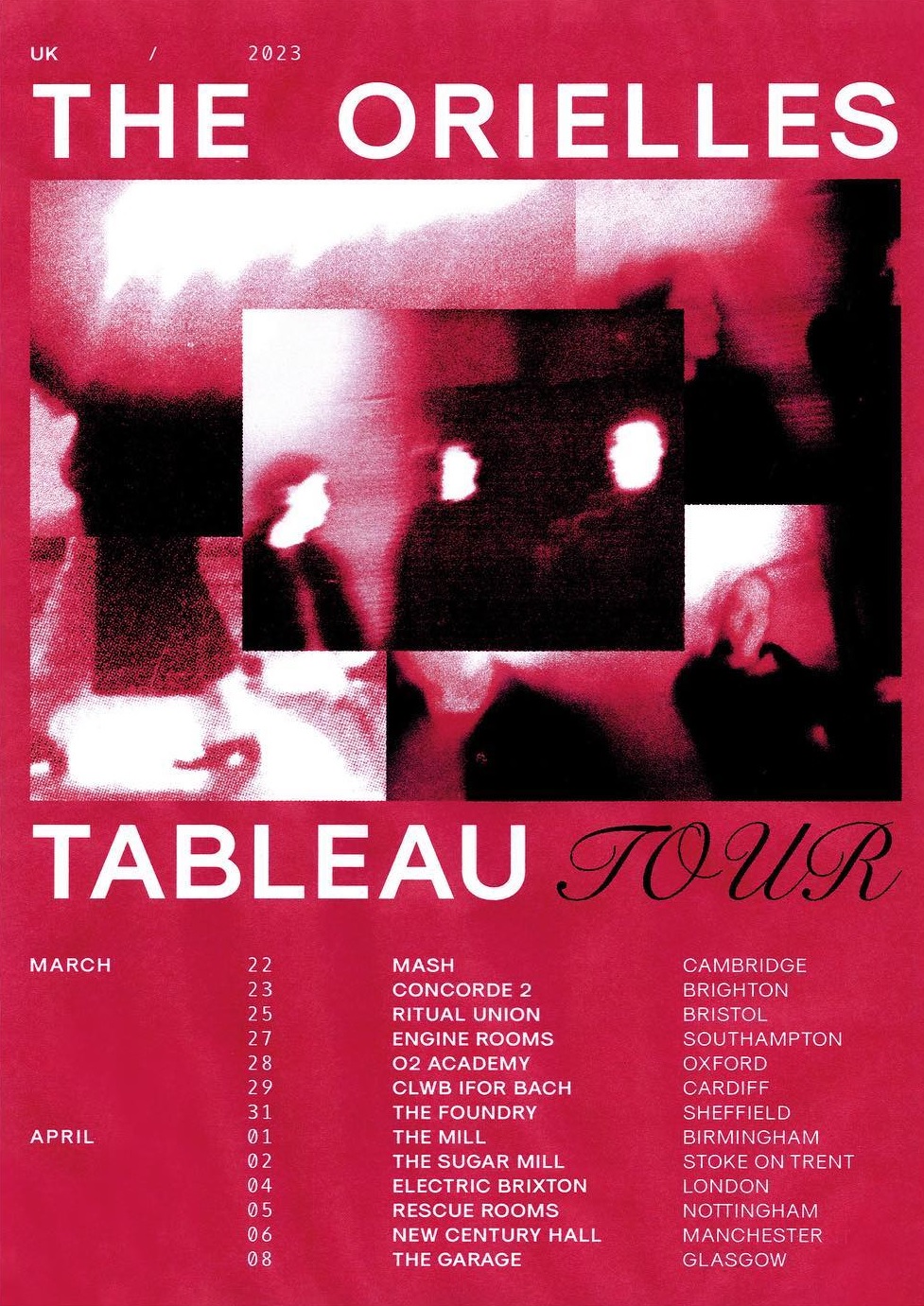
Back on 7th October, The Orielles dropped their fourth long player in the form of ‘Tableau’ (via the Heavenly label), which contained 16 new tracks. The album followed on from 2018’s debut ‘Silver Dollar Moment’, 2019’s ‘Disco Volador’, and 2021’s ‘La Vita Olistica’.
‘Tableau’ was self-produced in collaboration with Joel Anthony Patchett (King Krule, Tim Burgess) and available as double-album vinyl edition, CD and download.

The Orielles will be hitting thirteen towns right across the country in order to promote the new platter. The tour kicks off on 22nd March in Cambridge, and then they will be heading south to Brighton to play the popular Concorde 2 venue located on Madeira Drive opposite Brighton Beach on the following night, Thursday 23rd March – Tickets available HERE.

After Brighton they will be playing Bristol, Southampton, Oxford, Cardiff, Sheffield, Birmingham, Stoke-on-Trent, London, Nottingham, Manchester and ending up at Glasgow on 8th April.
Since forming in the West Yorkshire town of Halifax, over a decade ago whilst still in their early teens, the Orielles have journeyed from lo-fi DIY indie origins to Stereolab and A Certain Ratio inspired avant-pop even directing and scoring their own experimental film and now, with their new album they’ve created a genuinely modern record – an experimental double album which utilises holistic jazz practices, oblique 21st century electronica, experimental 1960s tape loop methods, otherworldly AutoTuned vocal sounds, the downer dub of Burial, Sonic Youth’s focus on improvisation and feedback, and Brian Eno’s legendary Oblique Strategy cards.

At the end of 2020, the Orielles – vocalist and bassist Esmé Hand-Halford, drummer Sidonie Hand-Halford and guitarist Henry Carlyle-Wade – regrouped to rehearse in Manchester, the city that the band have made their home across the last five years. When all of the band’s live dates to promote their second album were scrapped due to the pandemic, the group instead spent 2020 creating ‘La Vita Olistica’, a high-concept art film directed and written by the Hand-Halford sisters which they toured in cinemas across the following year, something which was the beginning of a series of creative breakthroughs that would result in ‘Tableau’.
One such breakthrough came when the Orielles were booked to host a monthly show on Soho Radio. Broadcasts quickly became impromptu research and development sessions for the ideas that would feed into the album.
“Doing that monthly meant we had a reason to meet up and bring two hours of music between us which we’d play, discuss, hold physically and share” says Henry. “We were listening to much more contemporary music than before” adds Esmé.

A further breakthrough came whilst remixing another band’s track in a studio in Goyt, on the edge of Stockport. This became the Goyt method, a central idea behind ‘Tableau’. “To Goyt it” explains Sidonie, “that’s getting all these pieces and rearranging them. We had vocal melodies and ideas that we’d then run through and sample, and play them on sample pads. We were being editors, really.”
Where the band had previously only gone into the studio once songs had been tightly crafted at the demo stage, the Orielles began to consider new practices in line with the modern sound they were aspiring to. No demo’s. Heavy improvisation. And no producer – only the band collaborating with friend and producer Joel Anthony Patchett.
The album would be mostly recorded across Summer 2021 holed away in Eastbourne. Its recording is a story of experimentation, improvisation and a band discovering how to create an entirely new sonic palette.

As well as the adoption of contemporary 21st century production, the Orielles used concepts from the world of art and minimalism in creating ‘Tableau’. Sidonie had researched the graphic scoring method of Pulitzer Prize nominated trumpeter and composer Wadada Leo Smith. They also utilised Oblique Strategies – the playing cards designed to aid creativity created by Brian Eno and artist Peter Schmidt in the early 1970s. “We’d been speaking about wanting to use them for ages, and then we found a set of cards at the studio in Eastbourne” explains Sidonie, “before each song, we’d pick out a card and that would be our motif for playing that take.”
The result is a double album that rewards serious immersion, as complex as it is diverse. Though ‘Tableau’ is likely to challenge preconceptions, this is something the band suggest they have been doing for quite some time anyway. “All through our whole career we’ve had to prove ourselves so, so much” explains Henry. “You can’t disconnect the age and the gender thing either” adds Esmé, “People belittle your age because they see women in the band. Whereas lad bands, if they’re eighteen it’s apparently exactly what people want to see.” Being from a small town in West Yorkshire may have added to that also, but Sidonie counters that “being from Halifax has also been a blessing, it’s kept our egos in check.”

Perhaps more than any of this, though, ‘Tableau’ is also simply the product of the unique telepathy between three singular musicians that have grown in symbiosis for over a decade now – simply the three of them in a room.
“As creators, for the fact we’ve produced it ourselves, it feels like a starting point” suggests Esmé, “even though everything that’s going previously has counted, this now feels like Ground Zero.” For the future, now, it’s all gates open.
Order ‘Tableau’ HERE.
Also if you are a fan of The Orielles, then you seriously need to check out their brand new 10 track release ‘The Orielles – ‘Live At Stoller Hall’, which you can locate on their Bandcamp page HERE.

The Orielles:
Esmé Dee Hand-Halford – lead vocals, bass
Henry Carlyle Wade – guitar, vocals
Sidonie B Hand-Halford – drums








